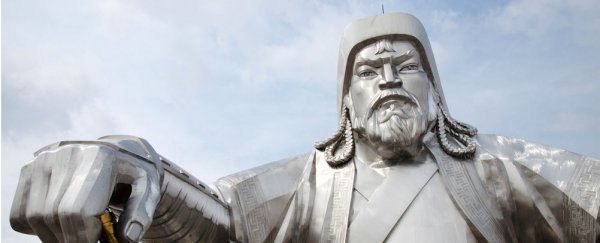When it comes to ensuring our genetic legacies live on well into the future, some people, it seems, are MUCH better than others.
Genghis Khan might be the best case in point.
The highly successful and sometimes mercilessly brutal Mongolian conqueror is believed to have fathered hundreds of children by many wives and concubines before his death in 1227.
So prolific were his sexual exploits that some scientists believe his genes have persisted to this day in millions of people.
As writer Ewen Callaway points out for Nature, the "case for Genghis Khan's genetic legacy is strong, if circumstantial."
A genetic study carried out in 2003 looked at data relating to Y chromosomes, which every human male inherits from his biological father.
It found that nearly 8 percent of men living in several different populations across Asia carry Y-chromosome sequences that are nearly identical. If expanded to global populations, that translates to about 0.5 percent of men, or roughly 16 million people.
"The variation that did exist in their DNA suggested that the lineage began around 1,000 years ago in Mongolia," Callaway writes.
For a Y-chromosome lineage to have this type of long-lasting, far-reaching impact, Genghis Khan would have needed several generations of descendants to continue having lots of babies, and to do so across a broadened geographic area.
"Lots of men have lots of sons, by chance. But what normally doesn't happen is the sons have a high probability of having lots of sons themselves. You have to have a reinforcing effect," geneticist Mark Jobling told Nature.
A new study, co-authored by Jobling, suggests Genghis Khan may have had some stiff competition when it comes to genetic legacy.
In addition to the lineages of Genghis Khan and the powerful Chinese ruler Giocangga, who died in 1582, the researchers have identified nine other highly successful lineages.
Jobling's team analysed the Y chromosomes of more than 5,000 men from 127 populations spanning Asia, and identified 11 Y-chromosome sequences shared by more than 20 individuals.
They studied genetic mutations in the shared sequences, and determined that the nine lineages were founded between 2100 BC and AD 700 — though researchers warn those dates could come with a sizeable margin of error.
As Callaway reports for Nature, the paternal founders "existed in both sedentary agricultural societies and nomadic cultures in the Middle East, India, southeast Asia and central Asia. Their dates coincide with the emergence of hierarchical, authoritarian societies in Asia during the Bronze Age, such as the Babylonians."
Three of the more recent lineages were linked to nomadic groups in northeast China and Mongolia, including those suspected of belonging to Genghis Khan and Giocangga. The researchers suspect that horses may have been one factor that have helped their inter-generational reproductive success.
The team's results were published in the European Journal of Human Genetics.
Source: Nature
